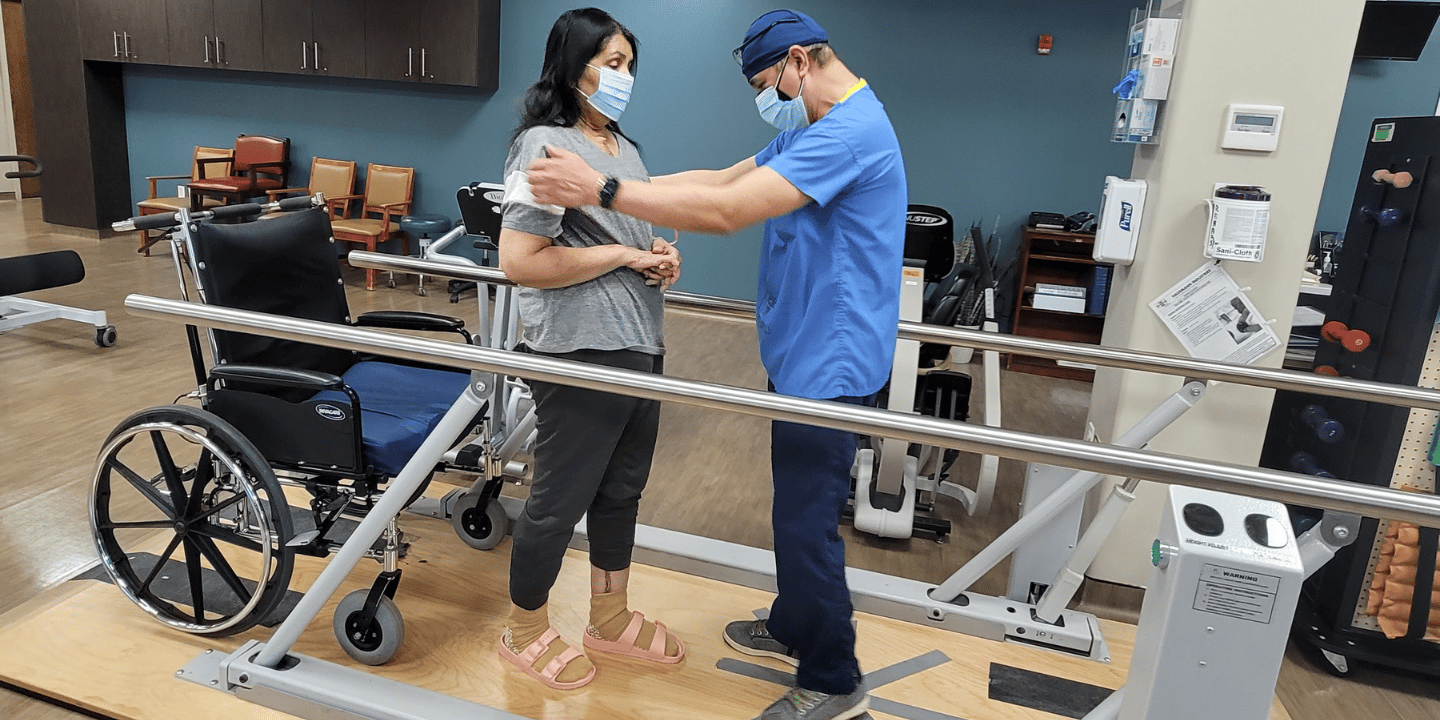Outpatient therapy is a vital component of healthcare that provides rehabilitation and treatment services to individuals outside of a hospital or inpatient facility setting. It offers flexibility and personalized care for various medical conditions, aiming to improve patients’ quality of life and functional abilities.
Understanding the Concept of Outpatient Therapy
Definition of Outpatient Therapy
Outpatient therapy refers to medical services and treatments that do not require an overnight stay in a hospital. Instead, patients visit a clinic, rehabilitation center, or outpatient department of a hospital for scheduled appointments.
Types of Outpatient Therapy Services
Outpatient therapy encompasses a range of services, including physical therapy, occupational therapy, speech therapy, and mental health counseling. Each type of therapy targets specific needs and conditions, tailored to the individual’s requirements.
Benefits of Outpatient Therapy
Outpatient therapy offers several advantages compared to inpatient treatment options.
Flexibility in Scheduling
Unlike inpatient therapy programs that follow strict schedules, outpatient therapy allows patients to schedule appointments at their convenience, accommodating work, school, and other commitments.
Cost-Effectiveness
Outpatient therapy tends to be more cost-effective than inpatient treatment, as it does not involve overnight stays or extensive hospital resources.
Continuity of Care
Patients receiving outpatient therapy can maintain their regular routines and support networks, promoting continuity of care and a smoother transition back to daily life.
Common Conditions Treated with Outpatient Therapy
Outpatient therapy addresses a wide range of medical conditions and injuries, including:
Physical Therapy for Rehabilitation
Physical therapists help patients recover from injuries, surgeries, or chronic conditions by improving mobility, strength, and function through exercises and manual therapy techniques.
Occupational Therapy for Daily Activities
Occupational therapists assist individuals in regaining independence in daily activities such as dressing, cooking, and driving, focusing on adaptive strategies and assistive devices.
Speech Therapy for Communication Disorders

Speech-language pathologists work with patients to improve speech, language, and swallowing abilities affected by conditions like stroke, traumatic brain injury, or developmental delays.
How Outpatient Therapy Works
Outpatient therapy follows a structured process to ensure effective treatment outcomes.
Initial Assessment
Upon initial evaluation, therapists assess the patient’s condition, medical history, and treatment goals to develop a personalized care plan.
Individualized Treatment Plans
Therapists design individualized treatment plans based on the assessment findings, incorporating evidence-based techniques and interventions tailored to the patient’s needs.
Ongoing Monitoring and Adjustments
Throughout the therapy process, therapists monitor progress, adjust treatment plans as needed, and provide education and support to optimize outcomes.
Choosing the Right Outpatient Therapy Provider
Selecting the right outpatient therapy provider is crucial for receiving quality care.
Credentials and Experience
Look for therapists who are licensed and experienced in treating your specific condition or injury, ensuring expertise and competence in delivering effective therapy.
Accessibility and Location
Consider the convenience of the therapy location and its proximity to your home or workplace to minimize travel time and logistical challenges.
Patient-Centered Approach
Choose a therapy provider that prioritizes patient-centered care, fostering a supportive and collaborative environment where your needs and preferences are valued.
What to Expect During Outpatient Therapy Sessions
Outpatient therapy sessions typically involve the following components:
Initial Evaluation
During the initial assessment, therapists gather information about your condition, medical history, and treatment goals to create a personalized care plan.
Treatment Techniques
Therapists utilize a variety of treatment techniques and modalities, such as exercise programs, manual therapy, therapeutic activities, and assistive devices, to address your specific needs.
Progress Tracking
Throughout the therapy process, therapists track your progress, adjust treatment strategies as necessary, and provide guidance and encouragement to help you achieve your goals.
Overcoming Challenges in Outpatient Therapy
While outpatient therapy offers many benefits, it may also present challenges that require proactive management.
Time Management
Balancing therapy appointments with other commitments can be challenging, but prioritizing your health and well-being is essential for successful outcomes.
Adherence to Treatment Plans
Consistent adherence to your treatment plan, including home exercises and self-care routines, is crucial for maximizing the benefits of outpatient therapy.
Dealing with Insurance Issues
Navigating insurance coverage and reimbursement processes can be complex, but seeking assistance from your therapy provider or insurance company can help address any concerns.
Tips for Maximizing the Benefits of Outpatient Therapy
To optimize your therapy experience and outcomes, consider the following tips:
Active Participation
Engage actively in your therapy sessions, ask questions, and communicate openly with your therapists about your progress, concerns, and goals.
Open Communication with Therapists
Maintain open and honest communication with your therapists, providing feedback on your experiences and any changes in your condition or needs.
Consistent Follow-Up
Attend all scheduled therapy appointments, follow your therapist’s recommendations, and adhere to your home exercise program to promote consistency and progress.
Case Studies: Success Stories in Outpatient Therapy
Real-life examples of individuals who have benefited from outpatient therapy can inspire hope and motivation for
others undergoing similar challenges. From a stroke survivor regaining mobility and independence through physical therapy to a child with autism improving communication skills with speech therapy, these success stories highlight the transformative impact of outpatient therapy on individuals’ lives.
The Future of Outpatient Therapy
As technology continues to advance, the future of outpatient therapy holds exciting possibilities for innovation and accessibility.
Technological Advancements
Emerging technologies such as virtual reality, wearable devices, and telehealth platforms are revolutionizing the delivery of outpatient therapy, offering new avenues for remote monitoring, personalized interventions, and interactive treatment modalities.
Integration with Telehealth
The integration of telehealth into outpatient therapy services expands access to care, particularly for individuals in remote or underserved areas. Telehealth platforms enable virtual consultations, remote monitoring, and home-based therapy sessions, enhancing convenience and continuity of care for patients.
Conclusion
Outpatient therapy plays a crucial role in promoting recovery, rehabilitation, and independence for individuals facing various medical conditions and injuries. With its flexibility, personalized approach, and focus on patient-centered care, outpatient therapy empowers individuals to achieve their goals and improve their quality of life.
FAQs
- Is outpatient therapy suitable for all medical conditions? Outpatient therapy can benefit individuals with a wide range of medical conditions, but the suitability of therapy depends on individual needs and treatment goals. Consult with a healthcare provider to determine the appropriateness of outpatient therapy for your specific condition.
- How often do I need to attend outpatient therapy sessions? The frequency of outpatient therapy sessions varies depending on the individual’s condition, treatment plan, and therapeutic goals. Your therapist will recommend a schedule tailored to your needs, which may range from several sessions per week to less frequent appointments.
- What should I bring to my outpatient therapy appointments? It’s helpful to bring any relevant medical records, insurance information, and a list of current medications to your outpatient therapy appointments. Wear comfortable clothing and footwear suitable for participating in therapy exercises and activities.
- Can I choose my outpatient therapy provider? In many cases, individuals have the freedom to choose their outpatient therapy provider based on factors such as location, specialty, and insurance coverage. Research potential providers, ask for recommendations, and consider scheduling consultations to find the best fit for your needs.
- How long does outpatient therapy typically last? The duration of outpatient therapy varies depending on factors such as the severity of the condition, treatment goals, and individual progress. Some individuals may require short-term therapy to address acute issues, while others may benefit from long-term or ongoing therapy to manage chronic conditions or maintain functional abilities.




















